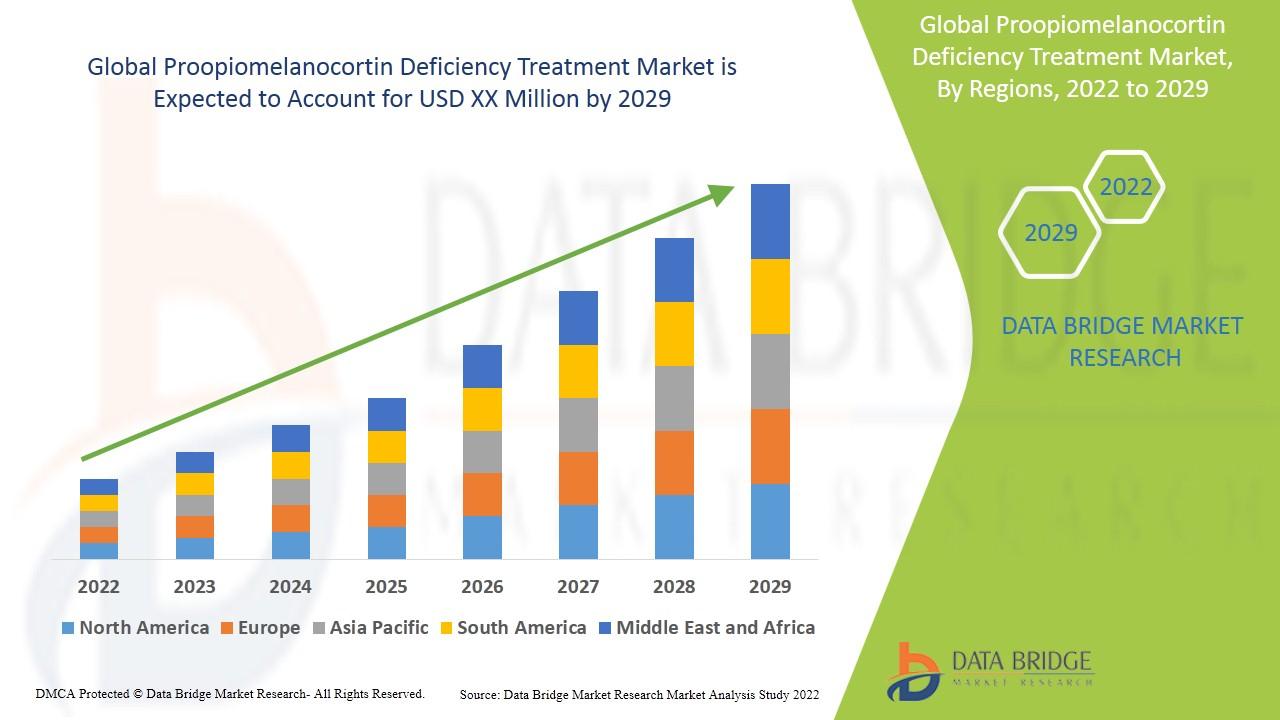"Executive Summary Proopiomelanocortin Deficiency Treatment Market :
Proopiomelanocortin deficiency treatment market is expected to gain market growth in the forecast period of 2022-2029. Data Bridge Market Research analyses the market to account to grow at a CAGR of 5.20% in the above mentioned forecast period. Proopiomelanocortin (POMC) deficiency is a type of monogenic obesity that causes severe early-onset obesity. People with this illness have low amounts of a hormone called adrenocorticotropic hormone (ACTH) and have red hair and pale skin, in addition to being obese. Affected neonates are normally a normal weight at birth, but they are always hungry, which leads to overfeeding (hyperphagia). By the age of one, the newborns have gained a lot of weight and are very obese. Affected people have an insatiable appetite and are obese for the rest of their lives. It's unclear whether these people are at risk for weight-related illnesses like heart disease or type 2 diabetes. Complete POMC deficiency results from loss of homozygous or complex heterozygosity of a functional mutation in the POMC gene (chromosome 2p23.3). POMC is regulated by leptin and cleaves into the melanocortin receptor (MC-R) ligands adrenocorticotrophin (ACTH) and melanocyte-stimulating hormones (MSH) alpha, beta, and gamma by prohormone convertases. Deficits in ligands, which result in a lack of activation of the MC1, MC2, and MC4 receptors, induce red hair colouring, adrenal insufficiency, and obesity, respectively.
Proopiomelanocortin Deficiency Treatment Market report provides the market potential for each geographical region based on the growth rate, macroeconomic parameters, consumer buying patterns, and market demand and supply scenarios. The report focuses on the top players in North America, Europe, Asia-Pacific, South America, and Middle East & Africa. Proopiomelanocortin Deficiency Treatment Market document delivers an extensive research on the current conditions of the industry, potential of the market in the present and the future prospects from various points of views. The numerical and statistical data has been denoted in the graphical format for a clear understanding of facts and figures.
The analysis covered in the global Proopiomelanocortin Deficiency Treatment Market report gives an assessment of various segments that are relied upon to witness the quickest development amid the approximated forecast frame. The market study encompasses a market attractiveness analysis, wherein each segment is benchmarked based on its market size, growth rate, and general attractiveness. All the information, facts, and statistics covered in the report lead to actionable ideas, improved decision-making and better deciding business strategies. Proopiomelanocortin Deficiency Treatment Market report contains historic data, present market trends, environment, technological innovation, upcoming technologies and the technical progress in the related industry.
Discover the latest trends, growth opportunities, and strategic insights in our comprehensive Proopiomelanocortin Deficiency Treatment Market report. Download Full Report: https://www.databridgemarketresearch.com/reports/global-proopiomelanocortin-deficiency-treatment-market
Proopiomelanocortin Deficiency Treatment Market Overview
**Segments**
- On the basis of treatment type, the global proopiomelanocortin deficiency treatment market can be segmented into medication, hormone replacement therapy, and others. The medication segment is expected to dominate the market as it is the primary course of treatment for individuals with proopiomelanocortin deficiency. This segment includes medications such as corticosteroids and ACTH analogues which help in managing the symptoms associated with the condition. Hormone replacement therapy is also a crucial segment, especially for individuals with hormone deficiencies caused by proopiomelanocortin deficiency.
- Based on distribution channel, the market can be categorized into hospital pharmacies, retail pharmacies, and online pharmacies. Hospital pharmacies are expected to hold a significant market share due to the availability of specialized medications and treatments for rare diseases like proopiomelanocortin deficiency. Retail pharmacies are also crucial as they cater to the ongoing medication needs of patients, providing convenience and accessibility. The online pharmacies segment is witnessing rapid growth, especially in regions with limited access to healthcare facilities.
- Geographically, the global proopiomelanocortin deficiency treatment market is segmented into North America, Europe, Asia Pacific, Latin America, and Middle East & Africa. North America is expected to dominate the market due to the high prevalence of rare diseases, well-established healthcare infrastructure, and increasing awareness about genetic disorders. Europe is also a significant market, driven by advancements in medical research and increasing investment in rare disease treatments. Asia Pacific is anticipated to witness rapid growth due to improving healthcare facilities and rising incidence of genetic disorders in the region.
**Market Players**
- Some of the key players in the global proopiomelanocortin deficiency treatment market include Novartis AG, Pfizer Inc., Merck & Co. Inc., Teva Pharmaceutical Industries Ltd., Endo International plc, Bristol-Myers Squibb Company, F. Hoffmann-La Roche Ltd, AstraZeneca, and Bayer AG. These companies are actively involved in research and development activities to introduce innovative treatments for proopiomelanocortin deficiency and other rare genetic disorders. Collaboration with healthcare providers and academic institutions is also a common strategy adopted by market players to expand their market presence and enhance their product offerings.
The global proopiomelanocortin deficiency treatment market continues to witness significant growth driven by various factors such as the increasing prevalence of rare genetic disorders, technological advancements in healthcare, and growing investment in research and development activities. One key trend shaping the market is the focus on personalized medicine, where treatments are tailored to the specific genetic makeup of individuals with proopiomelanocortin deficiency. This approach is expected to revolutionize treatment outcomes and improve patient care in the long run. Additionally, the rising awareness about genetic disorders and the importance of early diagnosis and treatment are contributing to the expansion of the market globally.
Another important aspect to consider is the regulatory landscape governing the development and commercialization of treatments for rare diseases like proopiomelanocortin deficiency. Government initiatives and incentives to encourage the development of orphan drugs are providing a favorable environment for market players to invest in research and innovation. This regulatory support, coupled with the strong pipeline of novel treatments in various stages of development, is fueling optimism among stakeholders about the future growth prospects of the proopiomelanocortin deficiency treatment market.
Furthermore, the competitive landscape of the market is characterized by intense research and development activities, strategic partnerships, and mergers and acquisitions among key players. Collaboration with academic institutions and research organizations is becoming increasingly common as companies strive to leverage their combined expertise and resources to accelerate the pace of drug discovery and development. In addition, investments in digital healthcare technologies and telemedicine solutions are opening up new avenues for reaching and treating patients with proopiomelanocortin deficiency, especially in remote or underserved regions.
Moreover, the market dynamics are also being influenced by changing consumer preferences and the shift towards patient-centric healthcare delivery models. Patients are increasingly taking an active role in managing their health, seeking out information online, and participating in shared decision-making with healthcare providers. This trend is driving the demand for more accessible and convenient treatment options, including the expansion of online pharmacies and telehealth services catering to individuals with rare genetic disorders like proopiomelanocortin deficiency.
In conclusion, the global proopiomelanocortin deficiency treatment market is poised for continued growth and innovation, driven by advancements in personalized medicine, regulatory support for orphan drug development, strategic collaborations among industry players, and evolving patient care preferences. As research continues to uncover new insights into the genetic mechanisms underlying rare diseases, the market is expected to witness a wave of novel treatments and therapeutic approaches that promise to improve outcomes and quality of life for individuals affected by proopiomelanocortin deficiency.The global proopiomelanocortin deficiency treatment market is a dynamic and rapidly evolving space driven by a combination of factors such as increasing prevalence of rare genetic disorders, technological advancements, and an upsurge in research and development activities. One of the key trends influencing the market is the shift towards personalized medicine, where treatments are tailored to the specific genetic profile of individuals with proopiomelanocortin deficiency. This personalized approach is anticipated to revolutionize treatment outcomes and enhance patient care in the long term by optimizing therapeutic efficacy and minimizing adverse effects.
A crucial aspect shaping the market landscape is the regulatory framework governing the development and commercialization of treatments for rare diseases like proopiomelanocortin deficiency. Government initiatives and incentives aimed at promoting the creation of orphan drugs are fostering a conducive environment for market players to invest in innovative research and development efforts. This regulatory support, coupled with a robust pipeline of novel therapeutic interventions in various stages of development, is instilling confidence among stakeholders regarding the future growth prospects of the proopiomelanocortin deficiency treatment market.
Furthermore, the competitive environment within the market is characterized by intense R&D endeavors, strategic alliances, and M&A activities among prominent industry participants. Collaborations with academic institutions and research establishments are increasingly prevalent as companies seek to harness collective expertise and resources to expedite drug discovery and development processes. Additionally, investments in digital healthcare technologies and telemedicine platforms are opening new avenues for reaching and treating individuals with proopiomelanocortin deficiency, particularly in remote or underserved regions, thereby expanding market access and driving patient engagement.
Moreover, the evolving dynamics of the market are also being influenced by changing consumer preferences and the advent of patient-centric healthcare delivery models. Patients are actively engaging in managing their health, seeking information online, and participating in shared decision-making with healthcare providers. This trend is fueling the demand for more convenient and accessible treatment modalities, including the proliferation of online pharmacies and telehealth services tailored to individuals with rare genetic disorders like proopiomelanocortin deficiency. As a result, market players are increasingly focusing on enhancing the patient experience and delivering comprehensive care solutions that meet the unique needs of this niche patient population.
In conclusion, the global proopiomelanocortin deficiency treatment market is poised for sustained growth and innovation, underpinned by advancements in personalized medicine, regulatory support for orphan drug development, strategic collaborations within the industry, and evolving patient care preferences. As research continues to uncover novel insights into the genetic intricacies of rare diseases, the market is expected to witness a wave of innovative treatments and therapeutic strategies that promise to enhance outcomes and quality of life for individuals affected by proopiomelanocortin deficiency.
The Proopiomelanocortin Deficiency Treatment Market is highly fragmented, featuring intense competition among both global and regional players striving for market share. To explore how global trends are shaping the future of the top 10 companies in the keyword market.
Learn More Now: https://www.databridgemarketresearch.com/reports/global-proopiomelanocortin-deficiency-treatment-market/companies
DBMR Nucleus: Powering Insights, Strategy & Growth
DBMR Nucleus is a dynamic, AI-powered business intelligence platform designed to revolutionize the way organizations access and interpret market data. Developed by Data Bridge Market Research, Nucleus integrates cutting-edge analytics with intuitive dashboards to deliver real-time insights across industries. From tracking market trends and competitive landscapes to uncovering growth opportunities, the platform enables strategic decision-making backed by data-driven evidence. Whether you're a startup or an enterprise, DBMR Nucleus equips you with the tools to stay ahead of the curve and fuel long-term success.
What insights readers can gather from the Proopiomelanocortin Deficiency Treatment Market report?
- Learn the behavior pattern of every Proopiomelanocortin Deficiency Treatment Market -product launches, expansions, collaborations and acquisitions in the market currently.
- Examine and study the progress outlook of the global Proopiomelanocortin Deficiency Treatment Market landscape, which includes, revenue, production & consumption and historical & forecast.
- Understand important drivers, restraints, opportunities and trends (DROT Analysis).
- Important trends, such as carbon footprint, R&D developments, prototype technologies, and globalization.
Browse More Reports:
Global Cataract Treatment Market
Global Cigarette Packaging Market
Europe Bio-Implants Market
Middle East and Africa Single Use Medical Devices Reprocessing Market
Global Anesthesia Dolorosa Treatment Market
Global Arrhythmia Monitoring Devices Market
Global Handheld Marijuana Vaporizers Market
Global Single Use Medical Devices Reprocessing Market
Asia-Pacific Bio-Implants Market
Middle East and Africa RF Over Fiber Market
Global Carbon Fiber Reinforced Plastic (CFRP) Propeller Shaft Market
Asia-Pacific Ataxia Market
Asia-Pacific Hospital Workforce Management Software Market
North America Semiconductor IP Market
Global Amyotrophic Lateral Sclerosis Treatment Market
Global Magnetometers Market
Global Hypercholesterolemia Treatment Market
Global Counter Pulsation Devices Market
Global Portion Cups Market
Europe Bioherbicides Market
Vietnam District Cooling Market
Global Olive Oil Market
Global Flexible Plastic Packaging Market
Global Continuous Inkjet Ink Market
Global Luxury Gin Market
About Data Bridge Market Research:
An absolute way to forecast what the future holds is to comprehend the trend today!
Data Bridge Market Research set forth itself as an unconventional and neoteric market research and consulting firm with an unparalleled level of resilience and integrated approaches. We are determined to unearth the best market opportunities and foster efficient information for your business to thrive in the market. Data Bridge endeavors to provide appropriate solutions to the complex business challenges and initiates an effortless decision-making process. Data Bridge is an aftermath of sheer wisdom and experience which was formulated and framed in the year 2015 in Pune.
Contact Us:
Data Bridge Market Research
US: +1 614 591 3140
UK: +44 845 154 9652
APAC : +653 1251 975
Email:- corporatesales@databridgemarketresearch.com
Tag
"



